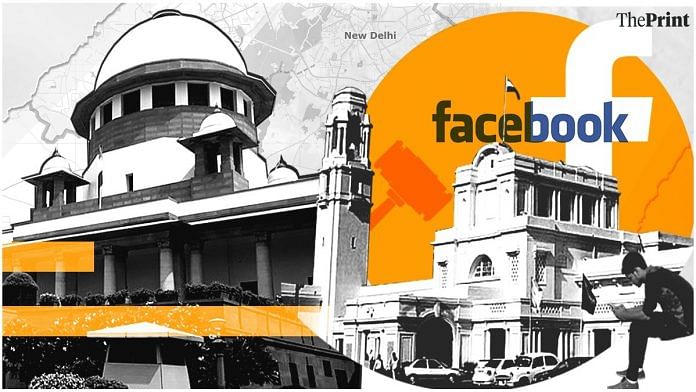New Delhi: On 8 July, while upholding the validity of summons issued to Facebook by Delhi Assembly’s Peace and Harmony Committee over the 2020 riots in northeast Delhi, a bench of the Supreme Court called for quick disposal of a related case pending in the top court for 16 years.
The 2003-05 case, N. Ravi vs. Legislative Assembly, and the Facebook vs Delhi Assembly case deal with the issue of parliamentary/legislative powers and privileges and what constitutes its breach.
Both cases also raise the question that is increasingly being debated today in various contexts — the definition of the limits to legislative/parliamentary powers and whether they should prevail over fundamental rights of free speech, silence and privacy of citizens.
The line or the threshold of the breach is the principal question pending before the seven-judge bench. The question becomes important with the prevalence and power of influence of social media — Facebook, for instance, has over 330 million users in India — and its role in the civic life of the nation, the court observed.
A three-judge bench led by Justice Sanjay Kishan Kaul noted that the N. Ravi matter “needs to be given some priority to settle the legal principles involved, especially in the context of expanding conflict on such matters”.
Facebook India vice president Ajit Mohan had challenged the summons issued by the assembly committee, even before the committee had concluded its inquiry into the riots. The court called this a “a pre-emptive move”.
The social media platform also sought to persuade the bench to codify the privilege powers for the legislature, which the court said was “upto the House’s wisdom to do so”.
Also read: ‘Vast powers must come with responsibility’: SC on Facebook’s role as social media platform
The contours of the N. Ravi case
In 2003, journalist N. Ravi and others had approached the apex court after the Tamil Nadu assembly ordered the arrest of journalists on charges of breach of privilege and gross contempt. K Kalimuthu, the then speaker of Tamil Nadu assembly, had issued the order in connection with an editorial in The Hindu mentioning then chief minister J. Jayalalithaa.
It was later reproduced in Murasoli, the DMK party daily, whose editor S. Selvam was also among the journalists the assembly had named in its list of people to be arrested.
In 2003, the Supreme Court stayed the arrests of the six journalists and issued notices to the assembly speaker, the assembly secretary, the Tamil Nadu director general of police and the Chennai police commissioner and two other officials.
The counsel for The Hindu journalists, senior advocate Harish Salve, had urged the court that “the time had come to codify privileges of legislatures…”.
“A slur on the Chief Minister Ms Jayalalithaa does not constitute contempt if one used the expression that she was fuming instead of saying angrily,” he had said.
During the brief hearing in the case then, the discussion revolved around the privileges of the members of the legislature and to what extent the media could criticise the functioning of the legislature. On behalf of Ravi and other journalists, Salve had then asked the court to lay down the law in the absence of one.
The definition of the breach, or limit of the privileges of the members of the legislature however, had not been settled by the time of the last hearing of the case in 2005.
In 2004, the case had also been referred to a seven-judge bench in view of the conflict between two judgments in similar and older cases — the MSM Sharma judgment delivered in 1958 and the Keshav Singh case of 1965.
The two judgments had given divergent views over the interplay between fundamental rights and parliamentary privileges. While the Sharma judgment said fundamental rights should prevail, the Keshav Singh verdict was that it could not take precedence over parliamentary privileges.
For a resolution on the matter, the Supreme Court bench that is hearing the Facebook case wants the court to open up the N. Ravi case again and give a verdict.
Also read: Not discharging public function, no positive obligation to further free speech: Twitter tells HC
Right to free speech includes right to remain silent: Facebook
SC’s reference to the N. Ravi case was made when Facebook claimed that the powers, privileges and immunities under Articles 105 (3) and 194 (3) of the Constitution — the two articles relate to power and privileges of the Parliament or State Assembly and its members — should not be able to diminish the fundamental right to free speech under Article 19 (1)(a).
Facebook also sought to expand the right of free speech and privacy against parliamentary privilege, by interpreting it to mean it had the right to remain silent and refuse to appear before the committee in pursuance of the summons.
According to Facebook, the threat of a “necessary action” was enough to “infringe both the right to free speech and privacy”. It argued that “the threatened invasion” of its right could be “removed by restraining the potential violator”.
Even if the right of privilege of the House is recognised, the social media platform contended, it must be “narrowly construed” so as to give maximum play to the fundamental rights of privacy and free speech, which includes the right to remain silent.
Privilege vis-à-vis fundamental rights
However, the court said it was difficult to accept Facebook’s argument as the jury was still out on the N. Ravi case, or the issue of parliamentary privilege vis-à-vis the right to freedom of speech and expression.
The privileges of an elected body such as the legislative assembly and its committees must be given full play and that it would be a “monumental tragedy” to accept Facebook’s argument that the legislature be restricted to merely enacting laws, the court said.
(Edited by Paramita Ghosh)
Also read: Won’t quash summons to Facebook in riots case, but Delhi panel can’t probe law & order issue: SC



